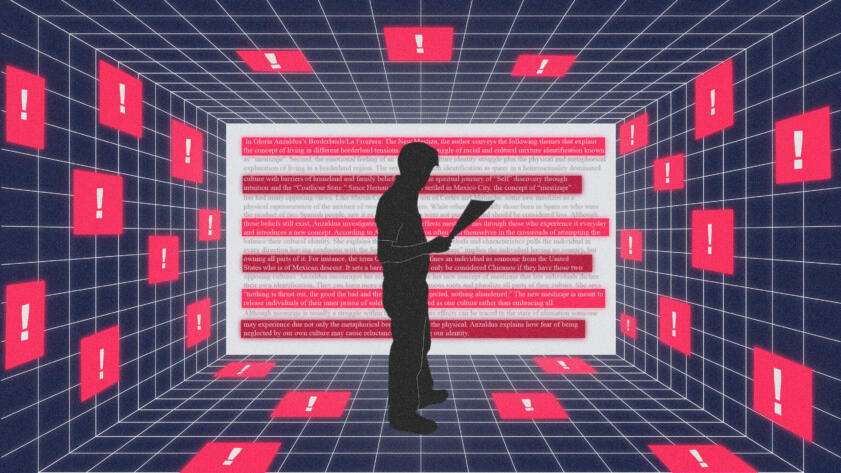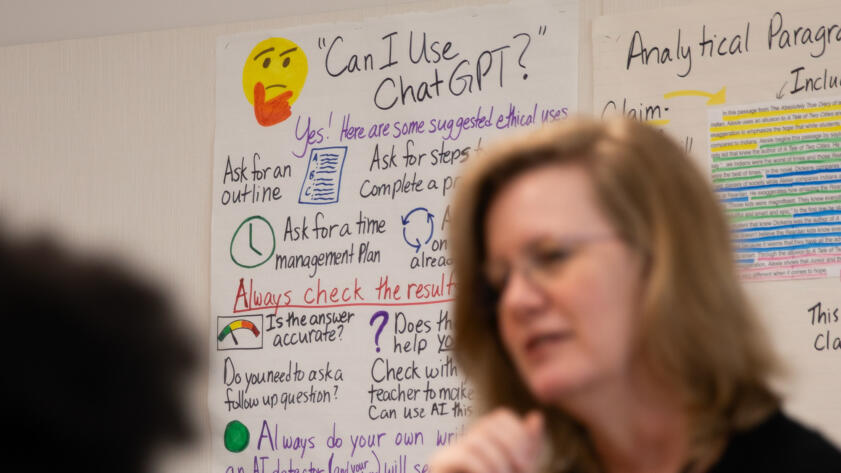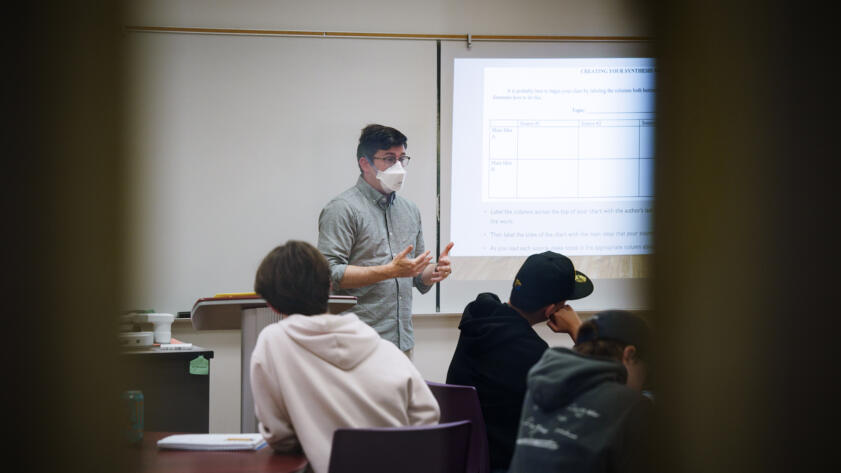The Markup, now a part of CalMatters, uses investigative reporting, data analysis, and software engineering to challenge technology to serve the public good. Sign up for Klaxon, a newsletter that delivers our stories and tools directly to your inbox.
If a California community college wants its faculty to be able to detect plagiarism and AI writing in student papers, it can buy software from a company called Turnitin at a discounted price. By banding together through the Community College League of California, each campus gets the purchasing power of the collective. Yet even though the league has more than four times as many colleges as the California State University system, its members pay more per student for Turnitin’s software.
And the Cal State system pays more than the University of California at Berkeley.
And UC Berkeley pays more than the City University of New York.

Artificial Intelligence
California colleges spend millions to catch plagiarism and AI. Is the faulty tech worth it?
Colleges and universities renew Turnitin subscriptions year after year even though its flawed detectors are expensive and require students to let the company keep their papers forever.
As part of an investigation into the consequences of this software’s use in higher education, CalMatters and The Markup collected purchasing records from approximately 60 California institutions as well as the CUNY system through public records requests. This investigation chronicles the dominance of Turnitin, which continues to collect millions of dollars every year from California colleges and universities despite its unsophisticated technology and its demand for a perpetual license to the student work it scans.
In reviewing records across California, CalMatters and The Markup also discovered wide variation in the amount Turnitin charged for its plagiarism-prevention tools, even when colleges were licensing the same product. While Turnitin did not respond to interview requests seeking information about its pricing strategy, experts said companies charge different amounts to different institutions based on how much they expect the institutions are willing to pay.
In 2020, Michel Davidoff retired as chief infrastructure officer in the California State University chancellor’s office, where he helped centralize technology purchases to secure huge discounts. When presented with the results of the CalMatters-Markup investigation into Turnitin pricing, Davidoff was not surprised. He said the size and reputation of an institution routinely sway the price of a given product.
“When Berkeley wants to negotiate pricing,” Davidoff said, “everyone wants the Berkeley logo on the website, knowing they bought it.”
Small colleges with little name recognition, then, get the worst deals. “They don’t have much money, they don’t have [many] students, and they’re paying the most,” he said.
The most extreme example of this variation came in records showing how much campuses paid during the 2021-22 school year. Turnitin had been flooded with customers the prior year when the Covid pandemic shut down campuses and instructors worried they couldn’t trust students at home. That year, UC Berkeley paid $2.11 per student for its Turnitin license. Cal State Long Beach and Antelope Valley College each paid $3.03 per student for the same product, records show. And the UC Irvine Division of Continuing Education paid more than double that, $6.50 per student.
Yet on the other side of the country, CUNY’s purchasing records show that the 200,000-student system got the best deal of all, paying just $1.79 per pupil for the same technology.
Davidoff, for his part, was pained to hear CUNY got a better deal than the Cal State system.
“CUNY? I’m crushed,” he said with a laugh.
Colleges tend to put out a “request for proposals” when they want to make institutional purchases. Companies then submit bids outlining the products they have, their capabilities, and the price. The Cal State system does not let companies charge significantly less than it costs to provide a product, but it otherwise encourages companies to give it the best deal they can.
The system last signed a contract with Turnitin in March of 2024, locking in the company’s basic plagiarism detector for $2.59 per student last year and $2.71 per student this year. For colleges to add the AI upgrade, Turnitin first offered institutions a total cost of $3.05 and $3.19 per student, respectively. Only six campuses took them up on the upgrade offer. But negotiations continued.

Hello World
A High School Student Explains How Educators Can Adapt to AI
We need more live student assessment, more emphasis on critical thinking—and less homework, William Liang writes
Leslie Kennedy, assistant vice chancellor of academic technology services for the Cal State Office of the Chancellor, reached out to her contact at Turnitin, saying there was demand for the detectors across the Cal State system, but that campuses couldn’t handle the cost.
“Turnitin came back to me and said, ‘We can give you better pricing if you buy for the whole system,’” Kennedy said. The company may have lost potential profits in discounting the AI detector for individual campuses, but it guaranteed itself more business. When Turnitin offered an additional 13% discount on top of the deal Cal State already had, Kennedy agreed to pay about $100,200 from her budget in the chancellor’s office to make it happen. And now 16 more campuses have access to the AI detector at a discounted price of $3.12 per student instead of $3.19.
Meanwhile, South Orange County Community College District is paying $3.57 per student for the same product this year.
While the per-student price for Turnitin sounds small, the cost adds up. The Cal State system has collectively spent over $6 million on this plagiarism-prevention technology in the last seven years. And UC Berkeley is in the middle of a 10-year, $1.2-million contract of its own.
CalMatters College Journalism Network fellows Delilah Brumer and Jeremy Garza helped collect purchasing records for this story.
The Kapor Foundation supported this project through its Research Fellowship program.





